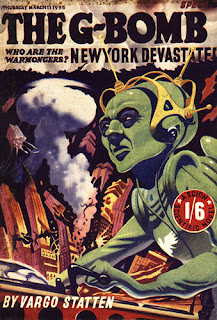There's been a bit of kerfuffle over what Science Fiction should be. It started with this essay. It has evoked several responses like this, and this. I was singularly unimpressed with the whole premise. Who the bleep has the right to say what Science Fiction IS or IS NOT?
Set phasers on ignore and raise the apathy field.
So, this is a bit of a meta-analysis. I've pontificated, or bloviated, about Science Fiction and Fantasy in its various manifestations. I'm altogether comfy with blending genres. Louis L'Amour wrote several nifty romance novels disguised as westerns. Larry Correia writes horror novels that don't suck because they have so much gunplay.
Lois McMaster Bujold has a whole lot of romance in her Science Fiction novels. If you say she isn't writing Science Fiction, then you are silly enough to say Louis L'Amour wasn't writing westerns.
Not all Science Fiction is the same. If you like science and technology, you'll gravitate toward Jules Verne. If you prefer sociology, you'll gravitate towards H. G. Wells.
Is either better or worse? Silly question. As silly a question as asking "Do you walk to school or carry your lunch?"
Meanwhile, there's a racist in the UK who says there's too much discrimination in Science Fiction, and that Science Fiction OUGHT to depict more blacks, wymyn, etc. The color of your skin or the polarity of your reproductive organs has nothing to do with how good or bad a human you are.
If you think that there needs to be more blacks and wymyn in Science Fiction, then you are obviously not colorblind. (And you are willfully ignorant of several significant writers working today.) Blacks and wymyn are just as capable of being racist or sexist as white guys are capable of reflecting and expressing our common humanity. You're not curing racism or sexism by making demands for more blacks and/or wymyn. You're merely manifesting the subtle racism of diminished expectations.
Science Fiction is not church. And Science Fiction is not a political party. It isn't a club with a secret handshake and standards of conduct.
Science Fiction is a kind of writing.
And what SHOULD any kind of writing do? It should be read. If the writing isn't given away freely, then it should be sold prior to being read. If the writer isn't independently wealthy, its sales should contribute to the writers' sustenance. Bad things happen when a writer does not get paid for his work.
Science Fiction SHOULD sell. If you write Russian Tractor Operas, it may make friends amongst the commissars, but it may not have widespread commercial appeal. Likewise, if you write Morality Plays, it may make friends amongst moralists (and I'm not talking Baptist morals, but stuff like sorting your recycleables), but it may not sell.
If Science Fiction becomes bogged down with a thicket of political or moralistic claptrap, it becomes propaganda. Customers don't buy propaganda. If you don't sell, you'd better have a government subsidy. Your work may be assigned reading, but it will be forgotten as soon as the regime changes.
Conversely, if your stories sell, and sell very well, the market will send signals in the form of money to produce more stories.
I love Science Fiction. I want to have a lot of Science Fiction available to me. This means I want a healthy and growing market for Science Fiction. The best thing that I can do to increase the health and size of the Science Fiction market is to write the Science Fiction stories that people want to buy.
This is what Science Fiction SHOULD be.





Yes, thank you.
ReplyDelete(And science fiction has quite a lot of wymyn, in my experience. Seriously.)
Also, Russian Tractor Opera sounds like it could be fun.
Actually, I derive great mirth from the propaganda of Communist states. The concept of a Russian Tractor Opera is just so mock-able that I am tempted to write one just for fun: Boy meets girl. Collective farm gets tractor from kindly Stalin. Boy, consumed with guilt about being white and male, drinks himself into oblivion. Girl, realizing she needs boy as much as a fish needs a bicycle, rides the tractor into the sunset.
DeleteElizabeth Moon and Brenda Clough are two of my favorites. Brenda Clough writes some Christian science fiction (not all of her work has a Christian emphasis). Her book The Doors of Death and Life actually has a conversion scene that is entirely plausible and fits. And she is a minority (Laotian, I believe).
ReplyDeleteYou may have noticed Leigh Brackett was the author of "Black Amazon of Mars" pictured atop this post. To say that there are no women or blacks in SF is stunningly ignorant.
Delete